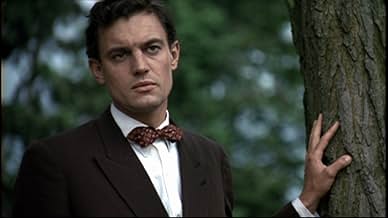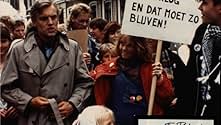AVALIAÇÃO DA IMDb
7,2/10
3,5 mil
SUA AVALIAÇÃO
Um médico holandês, assombrado por lembranças de infância da Segunda Guerra Mundial, luta para encontrar a paz enquanto passa a vida buscando respostas sobre a noite trágica que o moldou.Um médico holandês, assombrado por lembranças de infância da Segunda Guerra Mundial, luta para encontrar a paz enquanto passa a vida buscando respostas sobre a noite trágica que o moldou.Um médico holandês, assombrado por lembranças de infância da Segunda Guerra Mundial, luta para encontrar a paz enquanto passa a vida buscando respostas sobre a noite trágica que o moldou.
- Direção
- Roteiristas
- Artistas
- Ganhou 1 Oscar
- 5 vitórias no total
John Kraaijkamp Sr.
- Cor Takes
- (as John Kraaykamp)
Akkemay Elderenbos
- Sandra
- (as Akkemay)
- Direção
- Roteiristas
- Elenco e equipe completos
- Produção, bilheteria e muito mais no IMDbPro
Avaliações em destaque
I saw this movie in school for an asignment and I was suprised by the fact that this was a Dutch movie. This is one of those movies wich can stand the test of time. A involving story is told about Anton Steenwijk who we will follow through out this film. A must see film that tells the story of a typical dutch family in war time.
This film is based on the Harry Mulisch novel, and both have some distinguishing characteristics that go back - on purpose - to classic Greek tragedy theatre. The incredible co-incidence that carries the story is reminiscent of ancient literary 'vehicles' that carry a story. Thus, you should not look at the chance events as being part of the story, but as being the foundation for the story - they, in themselves, should not really be questioned.
Also, note that every chance meeting is preceded by a meeting with some kind of stone. The Dutch word for dice is 'dobbelsteen', or dicing-stone, so that the simile of dice and chance can be extended to stones and chance. This explains the significance of Anton meeting his first wife while visiting the Stone of Scones.
The book, more strongly than the film, is also constructed as a Greek tragedy, with a prologue, five acts and then an epilogue.
Anton Steenwijk is also interesting himself: he represses the events of the assault, but it keeps coming back at him. But he is an anaesthetist in more than one way - he puts his memories to sleep. Even in the final stages, when the story is already quite clear to him, he uses drugs at his house in Tuscany and seeks to ease a toothache in Amsterdam before going to the Ban the Bomb demonstration.
Personally, I think the book was translated into a film in brilliant fashion. My major qualm with it is the mediocrity of the sound and sound effects. Some pretty good acting and a fantastic storyline make this one well worth the watch.
Also, note that every chance meeting is preceded by a meeting with some kind of stone. The Dutch word for dice is 'dobbelsteen', or dicing-stone, so that the simile of dice and chance can be extended to stones and chance. This explains the significance of Anton meeting his first wife while visiting the Stone of Scones.
The book, more strongly than the film, is also constructed as a Greek tragedy, with a prologue, five acts and then an epilogue.
Anton Steenwijk is also interesting himself: he represses the events of the assault, but it keeps coming back at him. But he is an anaesthetist in more than one way - he puts his memories to sleep. Even in the final stages, when the story is already quite clear to him, he uses drugs at his house in Tuscany and seeks to ease a toothache in Amsterdam before going to the Ban the Bomb demonstration.
Personally, I think the book was translated into a film in brilliant fashion. My major qualm with it is the mediocrity of the sound and sound effects. Some pretty good acting and a fantastic storyline make this one well worth the watch.
10rob-1944
My family is from Haarlem and I feel very close to the places, scenes, characters and the atmosphere that the movie generates. The fact that there are only a view productions regarding the Dutch resistance is very sad to me as the Dutch resistance was on of the best organized during the German occupation. However the man that was shot dead outside Anton Steenwijk's house was an NSB participant. He belonged to the Dutch Nazi Party. As previously stated, by some people in this thread, he was not a German Nazi but a Dutch collaborator. A lot of my family were in the resistance during the Nazi occupation. Some of them were shut by the Germans, in the dunes near Bloemendaal a/Zee, the site of the "Ere Begraaf Plaats" where Anton takes his daughter to find Truus Koster's grave, in the latter end of the movie. When I was young we often spend time there, to visit friends and family that were executed during those troublesome years. I dearly love this movie and would recommend it to anyone.
In the long run non-violence eventually overcomes violence. It is extremely difficult not to become an extremist. Being the center of the wheel requires great patience and understanding, as one is always tempted to take shortcuts in life via violence. A senseless, ill-planned act of sabotage in the Netherlands gets an entire innocent family killed. This is a prime example of how violence eventually falls down upon itself.
This film deservedly won the best foreign film of the year for 1986. The performances are first-rate, especially that of the child actor and the adult actor of the main character. This film is both a mystery and a tragedy at the same time; not an easy combination to put together for a director. The direction is impeccable. The screenplay is beautifully written, and in the final analysis, all of the events that take place after WW 2 just do not have the same significance and power as that horrible event. Truly a film classic.
This film deservedly won the best foreign film of the year for 1986. The performances are first-rate, especially that of the child actor and the adult actor of the main character. This film is both a mystery and a tragedy at the same time; not an easy combination to put together for a director. The direction is impeccable. The screenplay is beautifully written, and in the final analysis, all of the events that take place after WW 2 just do not have the same significance and power as that horrible event. Truly a film classic.
The film and the book, are really very much the same here. I read the book first and then watched the film and I have really not much to say about both. They are both of the same quality, for both book and film feature the same amount of accidental meetings which are after a while quite unbelievable and that is all the criticism I have. The film has of course certain things which are better than the book, for instance it is more exciting, but then again the film also has it's downsides, for sometimes the acting is not that great. But overall the better and worse things level each other out so my verdicts for book and film are the same: pretty good.
If you like Mulisch's books and are interested in World War 2 read De Zaak 40/61.
7 out of 10
If you like Mulisch's books and are interested in World War 2 read De Zaak 40/61.
7 out of 10
Você sabia?
- Erros de gravaçãoTodas as entradas contêm spoilers
- Citações
Anton Steenwijk: My parents were innocent.
Fake Ploeg: My father was too!
Anton Steenwijk: I only know what I was told.
Fake Ploeg: Exactly.
- ConexõesFeatured in The 44th Annual Golden Globe Awards (1987)
Principais escolhas
Faça login para avaliar e ver a lista de recomendações personalizadas
- How long is The Assault?Fornecido pela Alexa
Detalhes
Bilheteria
- Faturamento bruto nos EUA e Canadá
- US$ 512.403
- Faturamento bruto mundial
- US$ 512.403
- Tempo de duração2 horas 21 minutos
- Mixagem de som
- Proporção
- 1.66 : 1
Contribua para esta página
Sugerir uma alteração ou adicionar conteúdo ausente
























